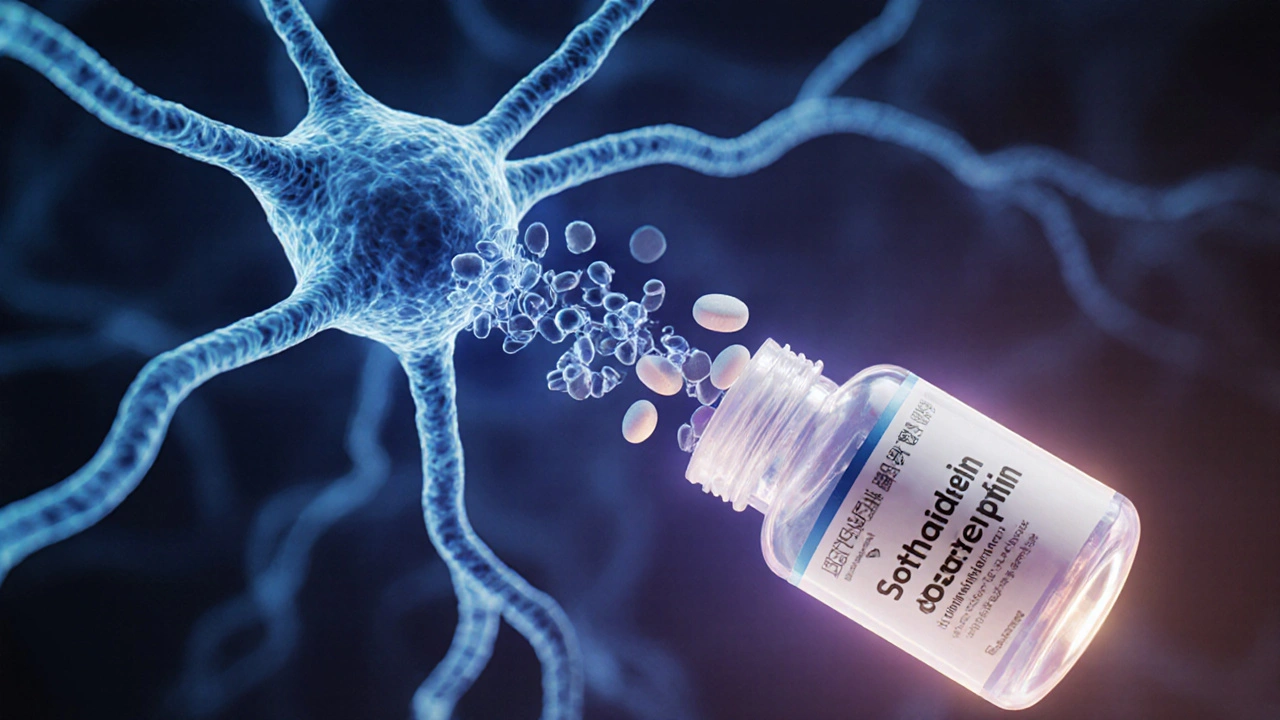Prothiaden (Dosulepin) vs Alternatives: In‑Depth Comparison

Oct, 12 2025
Antidepressant Decision Aid
Antidepressant Decision Aid
This tool helps you compare Prothiaden alternatives based on your medical conditions and preferences. It's not a substitute for professional medical advice.
Your Medical Profile
Quick Takeaways
- Prothiaden (Dosulepin) is a tricyclic antidepressant (TCA) that works well for severe depression but has a higher side‑effect burden than newer drugs.
- Common alternatives include other TCAs (amitriptyline, nortriptyline), SSRIs (sertraline, fluoxetine) and SNRIs (venlafaxine, duloxetine).
- When choosing, weigh factors such as onset of action, cardiovascular risk, drug‑interaction profile, and cost.
- For most patients without cardiac issues, an SSRI or SNRI is usually the first‑line choice.
- Always discuss dose tapering and monitoring with a prescriber before switching from Prothiaden to any alternative.
What Is Prothiaden?
When talking about Prothiaden (Dosulepin) it helps to start with a clear definition. Prothiaden is a tricyclic antidepressant (TCA) that was first marketed in the 1960s. It blocks the re‑uptake of norepinephrine and serotonin, boosting their levels in the brain and relieving depressive symptoms.
The drug is usually prescribed in 25‑150mg daily doses, taken at bedtime because of its sedating effect. Its half‑life is roughly 20‑30hours, which means steady‑state levels build up after about a week.
How Prothiaden Works
TCAs like Prothiaden interfere with the transporters that pull serotonin and norepinephrine back into the presynaptic neuron. By keeping these neurotransmitters in the synaptic cleft longer, mood‑regulating pathways become more active. The same mechanism also affects other receptors (histamine, muscarinic, alpha‑1 adrenergic), which explains many of its side effects.
Key Considerations Before Starting Prothiaden
- Cardiovascular safety: TCAs can prolong the QT interval and cause orthostatic hypotension, so doctors run an ECG for patients with existing heart disease.
- Drug interactions: Prothiaden is metabolised by CYP2D6 and CYP2C19. Co‑administration with strong inhibitors (e.g., fluoxetine) can raise plasma levels dramatically.
- Overdose risk: Because of its narrow therapeutic index, accidental overdose can be life‑threatening.
- Pregnancy & breastfeeding: Generally avoided unless benefits clearly outweigh risks.
Major Alternative Antidepressants
The market offers several classes of antidepressants that can replace Prothiaden. Below are the most common options, grouped by pharmacological class.
Other Tricyclics
Amitriptyline and Nortriptyline share the same TCA backbone. Amitriptyline is often used for neuropathic pain, while nortriptyline is considered a bit safer because it has fewer anticholinergic effects.
Selective Serotonin Reuptake Inhibitors (SSRIs)
Sertraline and Fluoxetine are the flagship SSRIs. They specifically block serotonin re‑uptake, have minimal cardiac impact, and are generally well‑tolerated.
Serotonin‑Norepinephrine Reuptake Inhibitors (SNRIs)
Venlafaxine and Duloxetine combine the serotonin boost of SSRIs with norepinephrine elevation, offering a middle ground between TCAs and SSRIs.
Side‑Effect Profiles at a Glance
| Drug | Class | Common Side‑effects | Typical Dose (mg) | Half‑life | Cost (generic, AU$ per month) |
|---|---|---|---|---|---|
| Prothiaden (Dosulepin) | TCA | Dry mouth, constipation, drowsiness, cardiac arrhythmia | 25‑150 | 20‑30h | ~12 |
| Amitriptyline | TCA | Weight gain, sedation, orthostatic hypotension | 25‑150 | 15‑30h | ~10 |
| Nortriptyline | TCA | Less anticholinergic, mild dizziness | 25‑100 | 18‑44h | ~11 |
| Sertraline | SSRI | Nausea, insomnia, sexual dysfunction | 50‑200 | 26h | ~8 |
| Fluoxetine | SSRI | Headache, agitation, appetite loss | 20‑80 | 4‑6days | ~7 |
| Venlafaxine | SNRI | Hypertension, sweating, nausea | 37.5‑225 | 5h | ~9 |
| Duloxetine | SNRI | Dry mouth, fatigue, increased liver enzymes | 30‑120 | 12h | ~10 |
How to Choose the Right Alternative
Here’s a simple decision flow you can use when talking to your prescriber:
- Do you have any heart problems? If yes, steer clear of TCAs like Prothiaden, amitriptyline, or nortriptyline.
- Are you sensitive to sexual side‑effects? SSRIs tend to cause more of these than SNRIs or TCAs.
- Do you need fast pain relief? Amitriptyline and duloxetine have strong evidence for neuropathic pain.
- Cost matters? All listed drugs are available as generics in Australia, but price variations exist; SSRI fluoxetine is typically the cheapest.
- How quickly do you need symptom improvement? TCAs and SNRIs often show benefits within 1-2 weeks, while fluoxetine may take 4‑6 weeks.
Remember, any change should be done under medical supervision, with a gradual taper to avoid withdrawal symptoms.

Safety, Interactions, and Monitoring
Regardless of the alternative you pick, keep an eye on these common safety touch‑points:
- Blood pressure: Venlafaxine can raise systolic pressure; schedule regular checks.
- Liver function: Duloxetine and fluoxetine are metabolised hepatically-ask for baseline LFTs.
- Serotonin syndrome: Combining any antidepressant with MAO‑inhibitors, tramadol, or St.John’s wort increases risk.
- Pregnancy: SSRIs are generally safer than TCAs, but discuss risks in each trimester.
When to Stay on Prothiaden
Sometimes the older drug is still the best fit. If you’ve been stable on Prothiaden for years, have no cardiac issues, and tolerate side‑effects, a switch could actually destabilise your mood. In such cases, doctors may keep you on the same dose while monitoring labs annually.
Frequently Asked Questions
Can I stop Prothiaden abruptly?
No. Stopping suddenly can cause withdrawal symptoms like dizziness, anxiety, and flu‑like feelings. Gradual tapering over weeks is the safe route.
Is Prothiaden more effective than SSRIs?
Effectiveness is similar for moderate‑to‑severe depression, but TCAs often work faster. The trade‑off is a higher side‑effect burden.
What’s the biggest risk of taking a TCA?
Cardiac toxicity-especially in overdose-plus anticholinergic effects like constipation and blurred vision.
Are there any food restrictions with Prothiaden?
Avoid alcohol, as it can increase sedation and worsen depression. Grapefruit juice can interfere with metabolism, raising drug levels.
How long does it take to feel better after switching?
Most patients notice an improvement within 1‑2weeks for TCAs and SNRIs, while SSRIs may need 4‑6weeks for full effect.
Can I use Prothiaden for anxiety?
Yes, TCAs are sometimes prescribed for generalized anxiety, but doctors often prefer SSRIs or SNRIs because they have a cleaner safety profile.
What should I do if I miss a dose?
Take the missed tablet as soon as you remember, unless it’s close to your next dose. Then skip the missed one and continue with your regular schedule.
Are generic versions of Prothiaden available?
Yes, generic dosulepin tablets are widely stocked in Australian pharmacies and are cheaper than the branded version.
Next Steps for Readers
If you’re currently on Prothiaden and wondering about a switch, follow this quick checklist:
- Write down any side‑effects you’re experiencing.
- Note any medical conditions (heart disease, liver issues, pregnancy).
- Gather recent lab results (ECG, liver function, renal function).
- Schedule a 15‑minute consultation with your GP or psychiatrist.
- Bring the checklist and ask about Prothiaden alternatives that fit your profile.
- Discuss a taper plan if a change is recommended.
- Monitor mood and side‑effects weekly for the first month after any change.
Staying informed and keeping a dialogue open with your healthcare provider is the best way to find the right balance between efficacy and tolerability.
